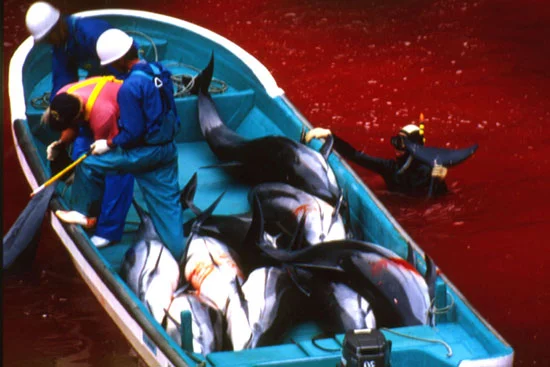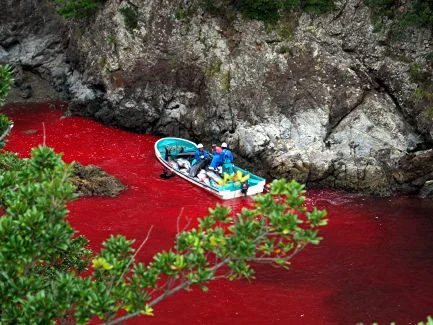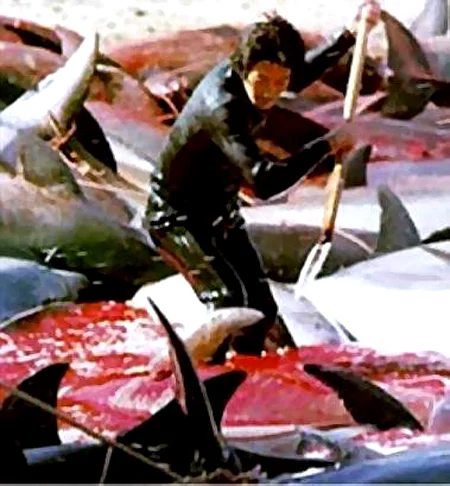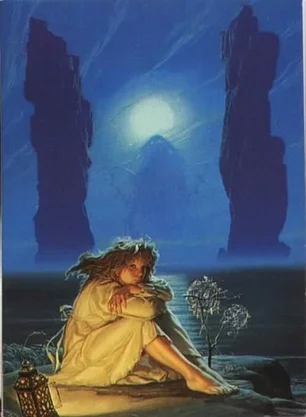Female, Dolphin-Loving Principles Can Win in Blood-Thirsty, Male-Dominated Taiji, Japan
/“The Cove” LA Times Review
“The Cove”, a much-discussed, award-winning, anti-dolphin and whale-killing movie about Taiji Japan, was a late addition to the Japanese Film Festival, which opened in Japan this week.
Reading the initial commentaries, I have a new angle on this problem of killing cetaceans, at least in the case of the small Japanese fishing port of Taiji.
“The Cove” came late to Japan’s film festival lineup. The press conference at which the screening was announced took place on September 16, the day the new administration of Yukio Hatoyama took office. The new prime minister attended Saturday’s opening ceremony for the festival, although organizers vehemently deny that a change in government had anything to do with “The Cove’s” addition to the lineup.
Using a technique called drive fishing, hunters in a line of motorized boats create a “wall of sound” between the dolphins and the open ocean by banging on metal poles lowered into the water; the poles have bell-shaped devices at one end to amplify the sound. The dolphins, who rely on sonar to navigate, are immediately disoriented and terrified and swim frantically to shore to escape the noise. There they are coralled into a small cove and trapped overnight by nets; at sunrise the next morning they are herded into an adjacent “killing cove,” where they are stabbed to death by hunters using harpoons, fish hooks, and knives. The emerald waters of the cove literally turn red with the animals’ blood. Some injured or exhausted dolphins simply drown. Fishermen drag still-living animals onto boats with hooks and harpoons or tie them to boats by the tail, forcing their airholes under water. The animals are hauled by truck, or dragged over concrete roads by their tails, to a nearby warehouse for butchering; those who are still alive are stabbed again and left to die of their injuries or bleed to death. Some drown in their own blood. via Brittanica.comWriting and reading about whale slaughter and “The Cove”, and conversing with our New Zealand friend Dave Head, I saw the cetacean-rights issue as largely economic and secondarily as cultural. I was wrong. The case is the opposite and mercury levels is a side-issue that might help the case.
Reading the early reports out of Japan about the Japanese people’s reaction to “The Cove”, I might as well have been reading about yesterday’s guilty verdict and flogging sentence for two women in Sudan, who wore pants.
What a Bloody Mess!
How can the president of Zambia say that childbirth is pornographic! My cortisol levels go on “red alert”, but for all my dismay, this is the reality in Zambia.
Looking at the photos of Japanese school children nearly bathed in the blood of dying whales and dolphins, while also reading new research about the minds of animals and especially cetaceans, my cortisol levels again go on “orange alert”.
I’ve been a feminist much longer than an advocate for dolphins and whales, or the whole family of cetaceans.
Taijii coves via unicircuits.comReflecting on one of my very popular, short pieces that’s traveling the Internet, I ask myself, did I just write a catchy title: When the Menu Calls for Whale Meat or Monkey Brain, Count Me Out?
Why — of all articles — is this one a hit?
The piece concerns my horror that a monkey would be slaughtered in my honor, right in front of me, after which our Chinese business party of four would enjoy warm, freshly-killed monkey brains.
Forget our vegetarian friends for the moment; most of us are close to wretching at the thought of eating monkey brains. Only the most hard-hearted among us can’t do a brain check on the fact that monkeys are kissing cousins, from an evolutionary standpoint.
Ironically, even though female blood sends righteous screams of indignation and aversion into the patriarchy, animal blood, war blood, whale and monkey blood is just fine. In many cases, the bloody deaths aren’t related to foraging for food, although that must be considered in starving countries.
As a global business person, I was beloved for respecting other cultures and not just saying “I’ve got the big American pencil. It’s my way, or I walk out the door.” “Saving face” means everything in many of these cultures, and my challenge at the monkey-brains dinner was to create a quick plan to “save face” and the monkey, too.
The relentless slaughter of whales in Taiji is steeped in the same historical, cultural mindset that was operating that night, when I saved the monkey’s life.
For a Western woman like myself, it’s beyond my comprehension that Zambian Post news editor Chansa Kabwela is facing five years in prison on pronography charges, for sending photos of a dead baby to the Zambian Health Minister.
Reality is that deeply patriarchal, often archaic cultures, are deeply distressed by all matters connected with female physicality.
The news out of Somalia is that women are now breast-checked by the morality squads, to be sure they’re not wearing bras. If questioned, proof must be given with both a feel-up by the officer in charge and them breast jiggling, after removal of the bra. (Do NOT ask me how women live through these inspection moments — at gunpoint.)
Bloody Mary via Flickr’s batabiddThe Rights of Non-Male Living Things
My maiden writing into the topic of whales was When the Subject is Women’s and Whale Rights, the Japanese Fall Far From Grace, if we don’t count my high school senior paper on the meaning of the great white whale in Moby Dick.
Whaling is a very patriarchal tradition, and the subject of their hunt — whales and dolphins — are gorgeous animals that represent female principles.
When I wrote Let’s Hope Smart Sensuality Pink Dolphins are Smart Enough to Stay Out of Japanese Waters, I was unconsciously or semi-consciously making the same point. Now I understand why folklore has it that putting a pregnant woman in the boat attracts dolphins, and also why Dave sent a video of a dolphin attending the birth of a baby.
The real challenges in getting the Japanese to change their patriarchal whaling ways, is akin to convincing the Sudanese Islamists to stop flogging women.
The challenge involves respect for female principles, not mastery over them. These archetypes play out in modern life with guns, not harpoons, but the logic is the same. America’s conscience is hardly clear, when the subject is bloody hands.
Reading that the Japanese press has kept information about “The Cove” out of the press, I reflect on Zambia’s latest contempt citation on the Post’s editor Fred M’Membe, for publishing an op-ed about ongoing “obscenity” proceedings against fellow Post journalist, Chansa Kabwela.
Free press doesn’t exist any more in Japan than Zambia. If we’re honest, the global challenge of a free press is an real one, including here in America. Can it be true that the Japanese don’t know the details of global censure around the killings in Taiji?
I think of Japan as a progressive society; goodness knows they’re effetes in the world of fashion and great design, and a major trend in Japan is called “grass eating men”. These young men are the opposite of the Taiji whale killers.
Do they not know about the killing? Are there Japanese whale activists at all? Japanese in Green Peace?
The patriarchal reality of the Taiji’s fishermen’s killing of the whales involves banging on metal poles to herd panicked dolphins into a cove, then spearing them to death in what protesters describe as a gory bloodbath. Read the caption in top photo for more details. via NYTimes
via Care2.comChanging Patriarchal Cultural Values
The NYTimes reports that some Japanese who saw “The Cove” Wednesday evening were shocked:
A patriarchal culture is under attack, from the Japanese point of view, even if the concern is unconscious. We must find a way to “save face”.
A big surprise to me is that the actual economic value of Taiji’s dolphin meat is about $1 million of a $3 million fishing revenue. Surely whale watching can compensate for the lost $1 million in slaughter revenue. All this blood and core and needless slaughter of cetaceans is worth only $1 million?
For men and women who have evolved forward into more life-sustaining philosophies about living, we “see red”, watching the blood pour out of these gorgeous mammals.
What is at stake from the Japanese perspective is another culture “under assault” by “enlightened” western values. The Japanese fishermen see cultural imperialism, which is a global catchword for telling international communities to mind their own business.
The cloak of “cultural imperialism” is also a challenge that international values around life and rights don’t apply to individual nations.
Being sensitive to the onslaught of golden arches around the world, how do we balance this legitimate concern with the rights of cetaceans and women?
Tostan’s Blood-Saving Principles in Somalia
My new friends in the Tostan Community, who recently celebrated the cessation of female genital cutting (FGC) in 14 Somali villages, would advise dophin-saving activists to work on the Japanese one by one, gaining their agreement to stop the slaughter.
Tostan’s philosophy of how to change ancient customs is perhaps frustrating in its slow pace but clearly delivers real results. Laws and intenational agreement rarely changes local customs. Only people do.
Indulge me here, please.
If you can imagine Somali men acting in plays that communicate the negative effects of FGC on women, which they did in honoring the new tradition of not participating in TGC, can we envision new customs that celebrate not killing whales in Taijii?
The concept sounds far-fetched, but perhaps anything is possible in a Tostan world.
Mind you, we have no guarantees that the bra-checking, Shebab morality police from Mogadishu won’t arrive on the Tostan scene with pointed guns, but for the moment Tostan has succeeded in working with local Somali villagers to change deeply embedded patriarchal traditions in a more favorable-to-women direction.,
In the Beginning … Celtic GoddessI have no doubt that cetaceans approve of these new Somali guidelines that will also lower maternal death rates, because whales and dolphins continually demonstrate caregiver skills. Surely the Taijii men are no more “masculine” than the Somalis.
Anne of Carversville will keep you posted on the battle for Smart Sensuality female principles worldwide, however they are expressed and embraced on Mother Earth.
Remember, this perspective is based on principles, not gender. I can personally attest to large numbers of men who want the world reorganized with female logic in mind. Anne
More Reading: Oprah Joins Ric Barry’s Oscar-Winning ‘The Cove’ Team To SaveJapanDolphins.org




